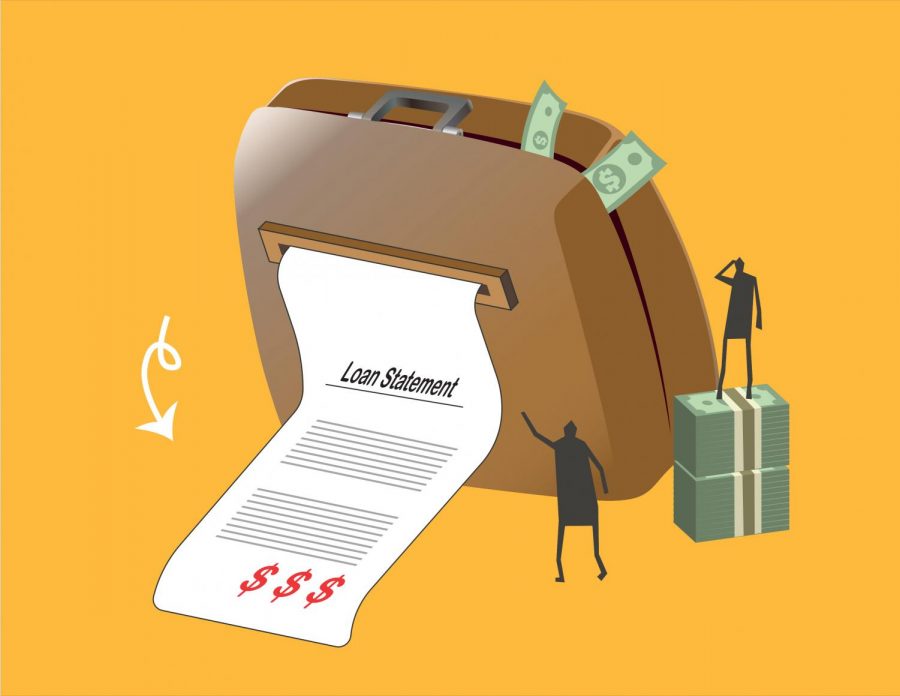OPINION: Emergency loan shouldn’t be repaid
Short-term financial solutions aren’t helping students at the greatest risk, they need more
More stories from GUS WATERS
The emergency short-term loan program at WSU is a way to start to help financially insecure students stay in school. It needs to be better funded so that it can expand into a financial relief package program with no payback required.
Jill Creighton, the dean of students at WSU, said the emergency short-term loan program at WSU is designed to give financial assistance to students in an emergency. The program gives short term loans of up to $500 that are due the same term they are borrowed and have a 6 percent interest rate applied. The loans are financed by a few donor families, and the entire program is self-sufficient in its funding and can only continue if loans are repaid.
The loan in and of itself is not very different from student loans, it is just on a smaller scale and needs to be paid back earlier. However, it is the only emergency that isn’t incredibly predatory.
The program has a strict set of guidelines for who is eligible to receive loans.
Karen Fischer, the associate dean of students, said in order for students to apply, they need to meet with a case manager and determine whether the student is in a financial emergency, and whether or not the student can pay the loan back. The student needs to have some source of readily available income and a conceivable way of paying the money back at the end of the term. Students are also limited to two loans for their entire undergraduate stay at WSU.
The program fails to assist students who need the most help to stay in college since they need to already have some form of financial stability. By only helping students who might otherwise be able to stay in college and instead providing a mismanaged safety net to students who might fall prey to a bad financial decision, the program is set up to fail.
However, the program is a solution for certain unique scenarios. The program is designed to help students with a consistent source of income to not fall into financial disaster if an unexpected event pops up, like a fender bender or a delayed paycheck.
WSU’s emergency short-term loans are a good relief system for a limited number of students, but the program has many shortcomings that need to be fixed if it is to achieve its goal.
If a student applies for a loan later in the semester, they will have a tiny window to repay a significant amount of money, which means that the case manager would be likely to turn their case down. Denying students aid at the end of semesters when they are most likely to need help upsets the basic purpose of the program.
Furthermore, if a student doesn’t have a consistent stream of income and they encounter financial disaster, they will probably be denied a loan. This means that the people who need help the most are the least likely to receive it from the program.
These loans do offer genuine assistance to those who qualify for it, but it ultimately fails to help students who need assistance the most. If the program is to succeed, it can’t even start to do that until it helps students who need help the most.
The program needs to secure more funding so that it can expand to offer a relief package to students who are unable to pay the loan back, or who apply for a loan late in term.
The Office of the Dean of Students needs to reach out to more donors and lobby the state to give a consistent stream of revenue to the service so that it can help more students.
Students who apply to a relief package need to prove that they are in a financial emergency and have no way of paying it back before the term ends and be limited to one package their entire undergrad stay at WSU.
Adding funding to the emergency short-term loan program at WSU won’t solve the deeper issues facing college expenses or access to opportunity, but it will help students with less be able to stay in school if they encounter an emergency that would otherwise throw them into a financial hole without much to dig themselves out of.
Gus Waters is a freshman political science and history double major from Bellevue, Wash. He can be contacted at 335-1140 or at [email protected]. The views expressed in this column do not necessarily represent the views of The Daily Evergreen, its editors or publishers.
Gus Waters is a freshman political science and history double major from Bellevue, WA.




John Doe • Mar 20, 2020 at 11:42 pm
I guess it wouldn’t be called a loan then. I bet everyone would love free money, much less a loan at 6% (far below any private or even federal loan you could take out)